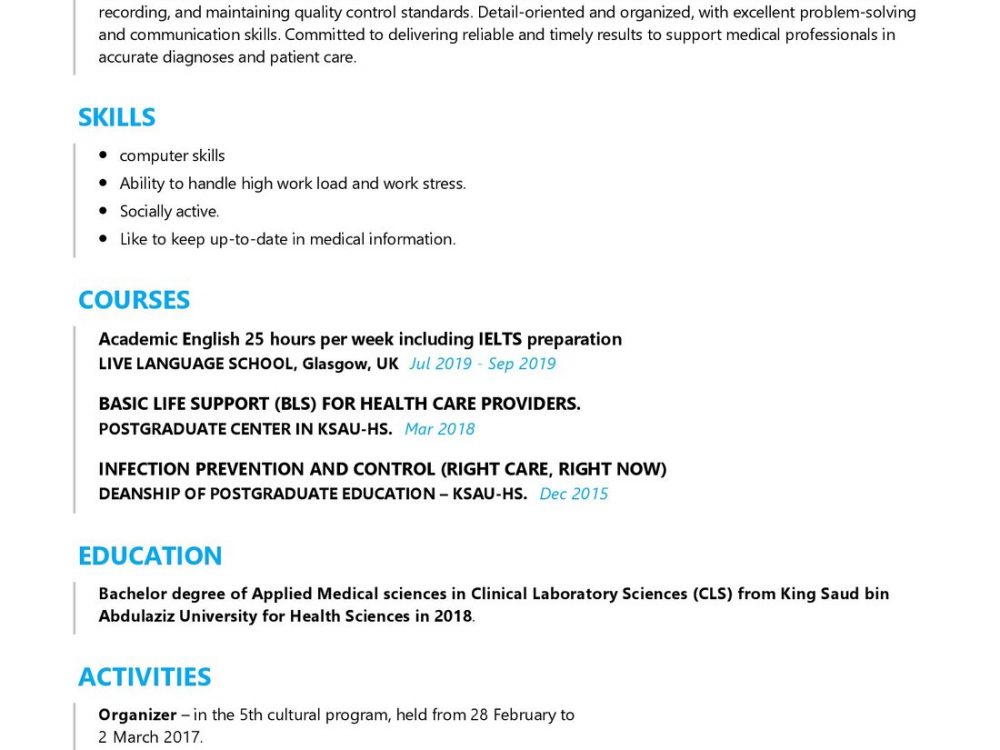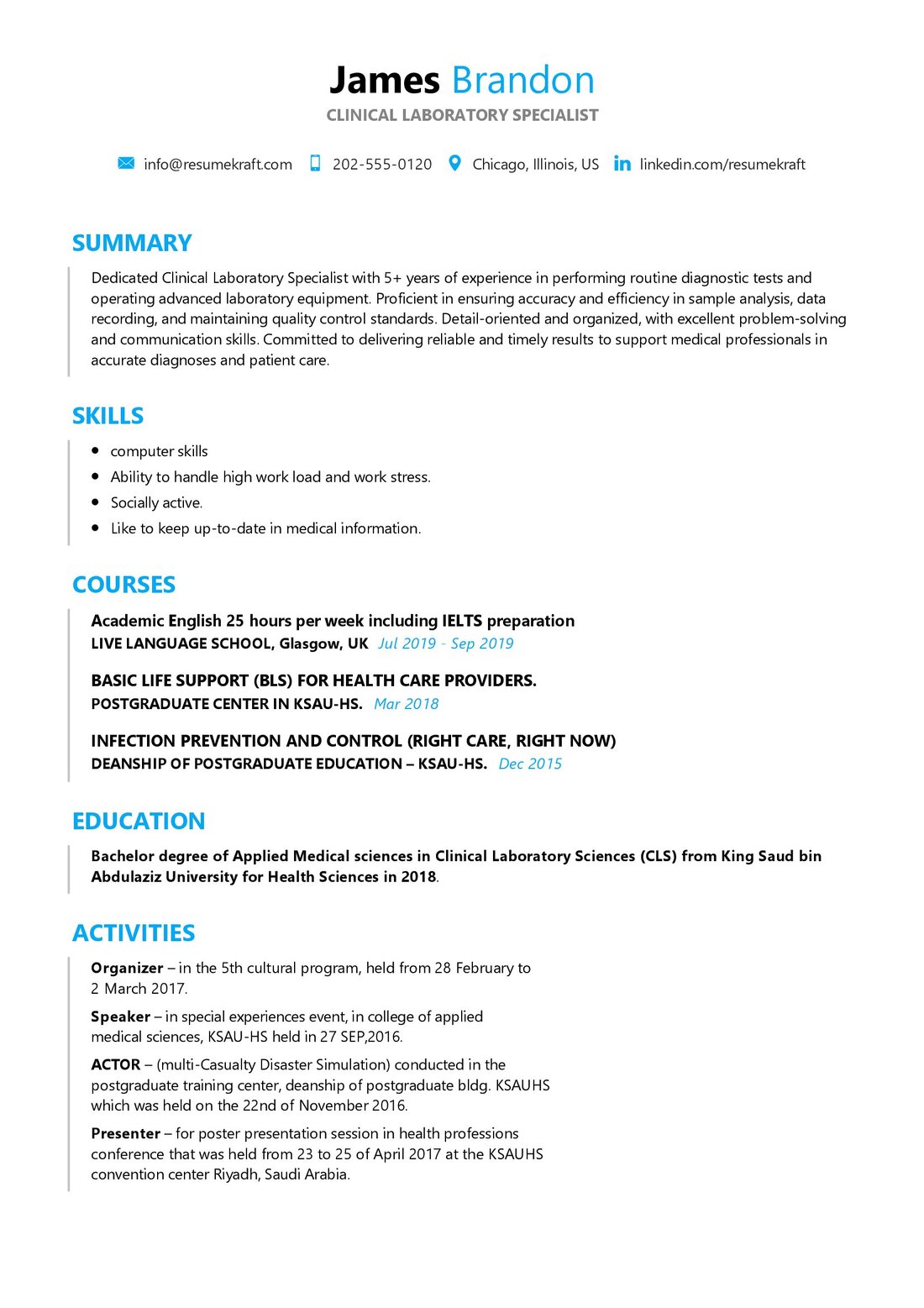Exploring the Role of a Clinical Laboratory Specialist
The field of healthcare relies on a multitude of professionals to ensure the accuracy and reliability of diagnostic tests. A Clinical Laboratory Specialist plays a vital role in this landscape, combining technical expertise with a commitment to precision. In this article, we will delve into the intricacies of the role, the essential job requirements, and effective ways to showcase your skills on a resume.
Job Requirements for a Clinical Laboratory Specialist
Embarking on a career as a Clinical Laboratory Specialist involves meeting specific educational and skill-based criteria. Let’s explore the fundamental requirements for this role:
- A Bachelor’s or Master’s degree in Medical Laboratory Science or a related field, demonstrating a solid foundation in laboratory techniques and procedures.
- Comprehensive knowledge of laboratory equipment operation and maintenance, including proficiency in conducting various diagnostic tests.
- Hands-on experience in clinical laboratory settings, showcasing a trajectory of increasing responsibility and technical proficiency.
- Strong analytical and problem-solving skills, honed through practical experiences in interpreting test results and troubleshooting technical issues.
- Excellent attention to detail, a crucial trait in ensuring the accuracy of laboratory procedures and maintaining quality control standards.
- Effective communication skills to collaborate with healthcare professionals, share insights, and contribute to the overall patient care process.
- Adaptability to work in a fast-paced healthcare environment, ensuring efficiency in conducting and reporting laboratory tests.
Consider obtaining additional certifications, such as ASCP Medical Laboratory Scientist (MLS) certification, to enhance your profile in the competitive healthcare job market.
Responsibilities of a Clinical Laboratory Specialist
The role of a Clinical Laboratory Specialist is multifaceted, involving a range of responsibilities essential for the smooth functioning of a clinical laboratory. Let’s dissect the core duties that define this critical position:
- Performing a variety of laboratory tests, including but not limited to hematology, microbiology, and clinical chemistry, to aid in patient diagnosis and treatment.
- Ensuring the accuracy of test results by following standardized procedures, conducting quality control checks, and troubleshooting any anomalies.
- Collaborating with healthcare professionals to interpret test results, providing valuable insights for patient care decisions.
- Maintaining and calibrating laboratory equipment, ensuring optimal functionality and adherence to regulatory standards.
- Participating in continuous education to stay abreast of advancements in laboratory technology and healthcare regulations.
- Ensuring compliance with safety protocols and maintaining a sterile and organized laboratory environment.
- Contributing to the development and implementation of new laboratory procedures and protocols.
Each responsibility requires a blend of technical expertise, attention to detail, and effective communication, making the role of a Clinical Laboratory Specialist both challenging and rewarding.
Clinical Laboratory Specialist Resume Writing Tips
Your resume is a powerful tool to showcase your skills and experiences as a Clinical Laboratory Specialist. Follow these tips to craft a compelling resume:
- Highlight specific laboratory techniques and tests you are proficient in, showcasing your technical expertise.
- Quantify your achievements by including metrics, such as the number of tests conducted daily or improvements in laboratory efficiency.
- Detail any leadership roles or projects where you demonstrated initiative and contributed to the improvement of laboratory processes.
- Include relevant certifications and continuous education efforts, emphasizing your commitment to professional development.
- Customize your resume for each application, aligning your skills and experiences with the specific job requirements.
Your resume should not just be a list of duties but a narrative that illustrates your impact and value as a Clinical Laboratory Specialist.
Clinical Laboratory Specialist Resume Summary Examples
Your resume summary serves as an introduction to your professional journey. Craft a compelling summary that encapsulates your experiences and strengths as a Clinical Laboratory Specialist:
- “Dedicated Clinical Laboratory Specialist with a Master’s degree in Medical Laboratory Science and five years of hands-on experience. Proficient in conducting a wide range of diagnostic tests and collaborating with healthcare professionals for accurate patient care.”
- “Results-driven Medical Laboratory Scientist with a proven track record in maintaining high laboratory standards. Specialized in hematology and microbiology, contributing to the development of efficient laboratory processes.”
- “Experienced Clinical Laboratory Specialist with a commitment to continuous learning. ASCP certified with expertise in clinical chemistry and a track record of implementing new laboratory procedures for enhanced efficiency.”
Your summary should entice employers to delve deeper into your resume, eager to learn more about your contributions in the field.
Create a Strong Experience Section for Your Clinical Laboratory Specialist Resume
The experience section is the heart of your resume, providing a detailed narrative of your career journey. Use this section to showcase your accomplishments and the impact you’ve had in previous roles:
- “Led a team of laboratory technicians in conducting over 500 diagnostic tests daily, resulting in a 15% improvement in overall laboratory efficiency.”
- “Implemented a new quality control system, reducing errors by 10% and ensuring the accuracy of test results in a high-volume laboratory setting.”
- “Collaborated with healthcare professionals to develop and implement standardized laboratory protocols, enhancing communication and efficiency in patient care.”
Each experience should tell a story of your growth, contributions, and the value you bring as a Clinical Laboratory Specialist.
Sample Education Section for Your Clinical Laboratory Specialist Resume
Your educational background is a crucial aspect of your resume, showcasing your foundation in laboratory science. List your educational milestones in a clear and concise manner:
- Master of Science in Medical Laboratory Science, XYZ University, a comprehensive program emphasizing advanced laboratory techniques, 2015.
- Bachelor of Science in Biology, ABC University, providing a solid foundation for understanding biological processes, 2012.
- ASCP Medical Laboratory Scientist (MLS) Certification, demonstrating expertise and commitment to professional standards, 2016.
Each educational qualification is a testament to your knowledge and dedication to excellence in the field of laboratory science.
Clinical Laboratory Specialist Skills for Your Resume
Your skill set is a valuable asset, showcasing your ability to excel in the role of a Clinical Laboratory Specialist. Highlight both technical and soft skills relevant to the position:
Technical Skills:
- Proficiency in laboratory techniques, including hematology, microbiology, and clinical chemistry.
- Operation and maintenance of laboratory equipment, ensuring optimal functionality.
- Knowledge of regulatory standards and adherence to safety protocols in clinical laboratory settings.
- Effective use of laboratory information systems for result reporting and data management.
- Quality control procedures to ensure the accuracy and reliability of diagnostic tests.
Soft Skills:
- Communication and collaboration with healthcare professionals for effective patient care.
- Attention to detail in conducting tests and interpreting results.
- Problem-solving abilities in troubleshooting technical issues and ensuring the quality of test results.
- Adaptability to work in a dynamic healthcare environment with efficiency.
- Continuous learning and staying updated on advancements in laboratory technology.
Each skill is a tool in your toolbox, contributing to your success as a Clinical Laboratory Specialist.
Common Mistakes to Avoid When Writing a Clinical Laboratory Specialist Resume
Avoiding common pitfalls is crucial when crafting your resume. Steer clear of these mistakes to present a polished and professional document:
- Avoid using a generic resume for multiple applications; tailor your resume for each position to highlight your fit for the specific role.
- Focus on achievements rather than just listing job duties, providing depth and context to your experiences.
- Don’t underestimate the importance of a cover letter; use it to tell your story and connect with potential employers on a personal level.
- Balance technical jargon; ensure your resume is accessible to both technical and non-technical readers.
- Thoroughly proofread your resume to maintain a professional image and avoid errors.
Each mistake can impact the effectiveness of your resume; avoid them to present a polished and professional document.
Key Takeaways for Your Clinical Laboratory Specialist Resume
As you craft your Clinical Laboratory Specialist resume, keep these key points in mind:
- Emphasize your technical proficiency in laboratory techniques and equipment operation.
- Quantify your achievements to provide a clear picture of your impact in previous roles.
- Showcase your continuous learning efforts and commitment to staying updated in the field.
- Customize your resume for each application, aligning your experiences with the specific requirements of the position.
Remember, your resume is more than a document; it’s a narrative of your journey, skills, and dedication as a Clinical Laboratory Specialist.
Finally, feel free to utilize resources like AI Resume Builder, Resume Design, Resume Samples, Resume Examples, Resume Skills, Resume Help, Resume Synonyms, and Job Responsibilities to create a standout application and prepare for the Clinical Laboratory Specialist job interview.
Armed with these insights and tips, you are now ready to craft a resume that is a true reflection of your journey, your skills, and your aspirations. Best of luck!


